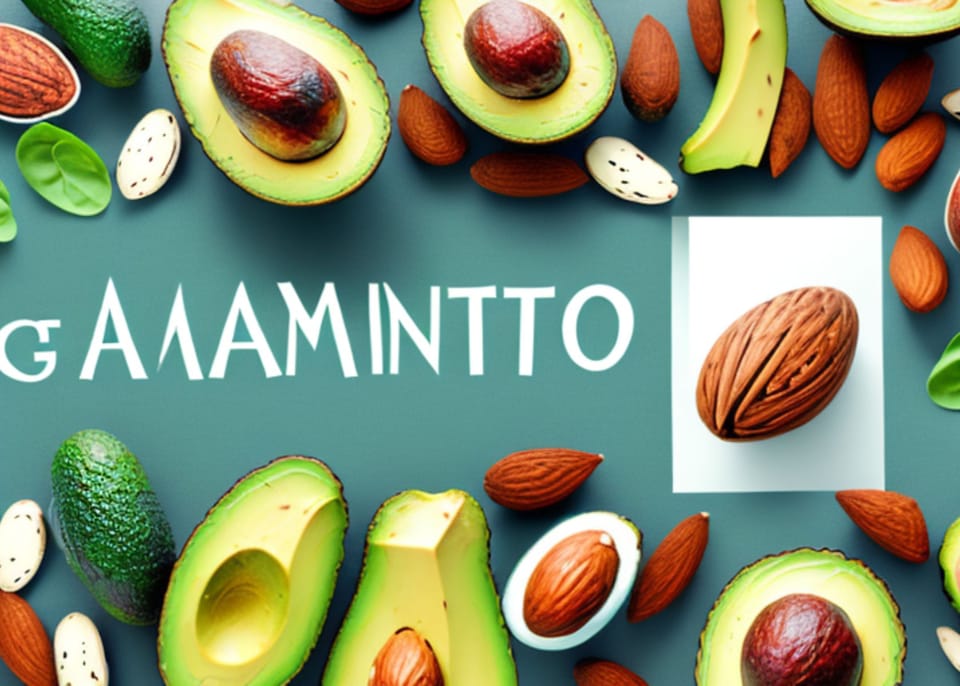Discover the Top Foods in Magnesium for Optimal Health

Magnesium is an essential mineral that plays a crucial role in our overall health and well-being. From promoting strong bones and a healthy heart to supporting muscle function and energy production, magnesium is undeniably important for our body's proper functioning. However, despite its significance, many people do not consume enough magnesium-rich foods in their diet, leading to potential health risks. In this article, we will delve into the world of magnesium and explore the top foods that can help you reach your daily magnesium intake and maintain optimal health.
Understanding the Importance of Magnesium in Our Diet
Before we dive into the specific foods, let's take a moment to understand why magnesium is so vital for our bodies. Magnesium is involved in over 300 biochemical reactions, making it a critical player in numerous bodily functions. It helps regulate blood pressure, maintain a stable heart rhythm, support proper nerve function, and contribute to the formation of healthy bones and teeth.
In addition, magnesium plays a vital role in energy production. It helps convert the food we eat into energy, ensuring that our body functions optimally. Without enough magnesium, we might experience fatigue, muscle weakness, and difficulty concentrating.
The Role of Magnesium in Body Functions
Magnesium is a key player in various bodily functions:
- Regulating blood pressure
- Maintaining a steady heart rhythm
- Aiding in muscle contraction and relaxation
- Promoting energy production
- Supporting proper nerve function
- Contributing to the formation of healthy bones and teeth
- Assisting in protein synthesis
With such a wide range of responsibilities, it is clear that incorporating magnesium-rich foods into our diet is crucial for optimal health.
Daily Recommended Intake of Magnesium
The recommended daily intake of magnesium varies depending on age and gender. Generally, adult men should aim for around 400-420 milligrams (mg), while women should aim for 310-320 mg. Pregnant and breastfeeding women may require slightly higher amounts.
It's important to note that these values are just guidelines, and individual needs may vary based on factors such as physical activity levels, overall health, and certain medical conditions. It's always best to consult your healthcare professional for personalized recommendations.
Now, let's explore some of the best food sources of magnesium:
1. Spinach: This leafy green vegetable is not only rich in iron but also packed with magnesium. Just one cup of cooked spinach provides about 157 mg of magnesium, which is almost half of the recommended daily intake for women.
2. Almonds: These crunchy nuts are a great snack option that can boost your magnesium intake. A quarter cup of almonds contains approximately 97 mg of magnesium.
3. Avocado: Aside from being a delicious and creamy fruit, avocados are also a good source of magnesium. One medium-sized avocado contains around 58 mg of magnesium.
4. Black beans: These legumes are not only high in fiber and protein but also a fantastic source of magnesium. Half a cup of cooked black beans provides about 60 mg of magnesium.
5. Dark chocolate: Yes, you read that right! Dark chocolate with a high cocoa content is not only a treat for your taste buds but also a decent source of magnesium. A 1-ounce (28 grams) serving of dark chocolate contains approximately 64 mg of magnesium.
By incorporating these magnesium-rich foods into your diet, you can ensure that you are meeting your daily requirements and supporting your overall health and well-being.
Identifying Magnesium-Rich Foods
Now that we understand the importance of magnesium, let's explore some of the top foods that are abundant in this essential mineral.
Green Leafy Vegetables: A Magnesium Powerhouse
When it comes to magnesium-rich foods, leafy green vegetables are a fantastic choice. Spinach, kale, Swiss chard, and collard greens are all packed with magnesium, along with a wealth of other vitamins and minerals. These vibrant greens can be enjoyed raw in salads, sautéed as a side dish, or blended into smoothies for an added nutrient boost.
But did you know that green leafy vegetables offer even more benefits beyond their magnesium content? These vegetables are also rich in antioxidants, which help protect your cells from damage caused by harmful molecules called free radicals. In addition, they are a great source of dietary fiber, which supports healthy digestion and can help you feel fuller for longer.
Nuts and Seeds: Small but Mighty in Magnesium
Nuts and seeds are not only delicious but also incredibly nutritious. Almonds, cashews, pine nuts, and Brazil nuts are all excellent sources of magnesium. Additionally, pumpkin seeds, flaxseeds, and chia seeds are fantastic options for boosting your magnesium intake. Consider adding a handful of nuts or seeds to your morning yogurt or enjoying them as a convenient on-the-go snack.
What makes nuts and seeds even more impressive is their wide array of health benefits. They are rich in healthy fats, which are essential for brain health and can help reduce the risk of heart disease. Furthermore, they contain a variety of vitamins, minerals, and antioxidants that contribute to overall well-being. So, not only do nuts and seeds provide a magnesium boost, but they also offer a multitude of other advantages for your body.
Whole Grains: A Wholesome Source of Magnesium
Whole grains are not only a great source of dietary fiber but also provide a significant amount of magnesium. Quinoa, brown rice, oats, and whole wheat products are all excellent choices to increase your magnesium intake. Start your day with a hearty bowl of oatmeal or swap out refined grains for whole grain alternatives to reap the benefits.
In addition to their magnesium content, whole grains offer a host of other nutrients that are essential for a balanced diet. They are rich in B vitamins, which play a crucial role in energy production and brain function. Whole grains also contain antioxidants and phytochemicals, which have been linked to a reduced risk of chronic diseases such as heart disease and certain types of cancer. So, by incorporating whole grains into your meals, you not only boost your magnesium intake but also enhance your overall nutritional profile.
Incorporating Magnesium-Rich Foods into Your Diet
Now that you have a list of magnesium-rich foods, let's explore some practical ways to incorporate them into your daily meals.
But first, let's delve into the incredible benefits of magnesium. Did you know that magnesium plays a crucial role in over 300 biochemical reactions in the body? It helps maintain normal nerve and muscle function, supports a healthy immune system, and even contributes to strong bones. So, it's no wonder that incorporating magnesium-rich foods into your diet is essential for overall well-being.
Delicious and Nutritious Magnesium-Rich Recipes
Why not kick-start your day with a magnesium-packed green smoothie? Blend spinach, banana, almond milk, and a handful of flaxseeds for a nourishing breakfast that will fuel your body with essential nutrients. Not only will this smoothie provide you with a healthy dose of magnesium, but it will also give you a boost of energy to conquer the day ahead.
For a satisfying lunch or dinner option, try a colorful quinoa salad. Combine cooked quinoa with chopped almonds, diced vegetables, and a drizzle of lemon vinaigrette for a refreshing and nutritious meal. This vibrant dish not only provides a delightful crunch but also delivers a generous amount of magnesium to support your body's needs.
When snacking, reach for a handful of mixed nuts and seeds or whip up a batch of homemade granola bars using oats, nuts, seeds, and a touch of honey or maple syrup. These wholesome snacks not only satisfy your cravings but also provide you with a convenient way to incorporate magnesium-rich foods into your daily routine.
Tips for Maximizing Magnesium Absorption
While incorporating magnesium-rich foods into your diet is essential, it's also important to ensure optimal absorption. Here are a few tips to help maximize magnesium absorption:
- Pair magnesium-rich foods with vitamin D-rich foods to improve absorption. For example, enjoy a spinach salad with a side of grilled salmon for a delicious and nutrient-packed meal.
- Avoid excessive consumption of caffeine and alcohol, as they can hinder magnesium absorption. Instead, opt for herbal teas or infused water to stay hydrated without compromising magnesium levels.
- Include probiotic-rich foods, such as yogurt or sauerkraut, to support healthy gut function and enhance magnesium absorption. A balanced gut microbiome is key to ensuring efficient nutrient absorption.
- Consider cooking foods in magnesium-rich broth or water to enhance the mineral content and absorption. Simmering vegetables in a homemade vegetable broth can infuse them with an extra dose of magnesium.
By following these tips, you can make the most of the magnesium-rich foods you consume and optimize your overall magnesium levels. Remember, a well-rounded diet that includes a variety of magnesium-rich foods is the key to maintaining a healthy and balanced lifestyle.
Potential Health Risks of Magnesium Deficiency
Magnesium deficiency, although often overlooked, can have significant implications for our health. Recognizing the signs of magnesium deficiency is crucial for maintaining optimal well-being.
Common Symptoms of Magnesium Deficiency
Some common symptoms of magnesium deficiency include:
- Muscle cramps and spasms
- Fatigue and weakness
- Migraines and headaches
- Irritability and mood swings
- Irregular heartbeat
If you experience any of these symptoms, it may be worth considering your magnesium intake and consulting with a healthcare professional for appropriate guidance.
Long-Term Health Implications of Low Magnesium Levels
Ignoring magnesium deficiency can have long-term implications for our health. Low magnesium levels have been associated with an increased risk of chronic conditions such as cardiovascular disease, type 2 diabetes, osteoporosis, and migraines.
Ensuring an adequate intake of magnesium through a balanced diet is crucial for minimizing these risks and promoting optimal health.
The Role of Magnesium Supplements in a Balanced Diet
While it's best to obtain nutrients through a well-rounded diet, certain situations may necessitate the use of magnesium supplements.
When to Consider Magnesium Supplements
If you have difficulty meeting your daily magnesium needs through food alone, have a medical condition that hinders magnesium absorption, or are following a restricted diet, your healthcare provider may recommend magnesium supplements to bridge the gap.
However, it's important to remember that supplements should never replace a healthy, balanced diet. They should always be taken under the guidance of a healthcare professional to ensure appropriate dosage and avoid potential interactions with medications or other health conditions.
Choosing the Right Magnesium Supplement for You
When choosing a magnesium supplement, there are several forms and dosages to consider. Magnesium citrate, magnesium glycinate, and magnesium oxide are among the most common forms available.
It's best to consult with your healthcare professional to determine the most suitable magnesium supplement for your individual needs and to ensure its compatibility with any existing health conditions or medications.
In Conclusion
Magnesium is a vital mineral that should not be overlooked when striving for optimal health. By prioritizing magnesium-rich foods in our diet, we can support numerous bodily functions, maintain energy levels, and reduce the risk of chronic health conditions.
Remember to vary your sources of magnesium, incorporate various food groups, and experiment with recipes to keep your diet exciting and enjoyable. If you have concerns about your magnesium levels, it's always best to consult with a healthcare professional who can provide personalized guidance.
Embrace the power of magnesium-rich foods and discover the profound impact they can have on your overall health and well-being!
Thanks for reading.
BestPharmaReviews.



